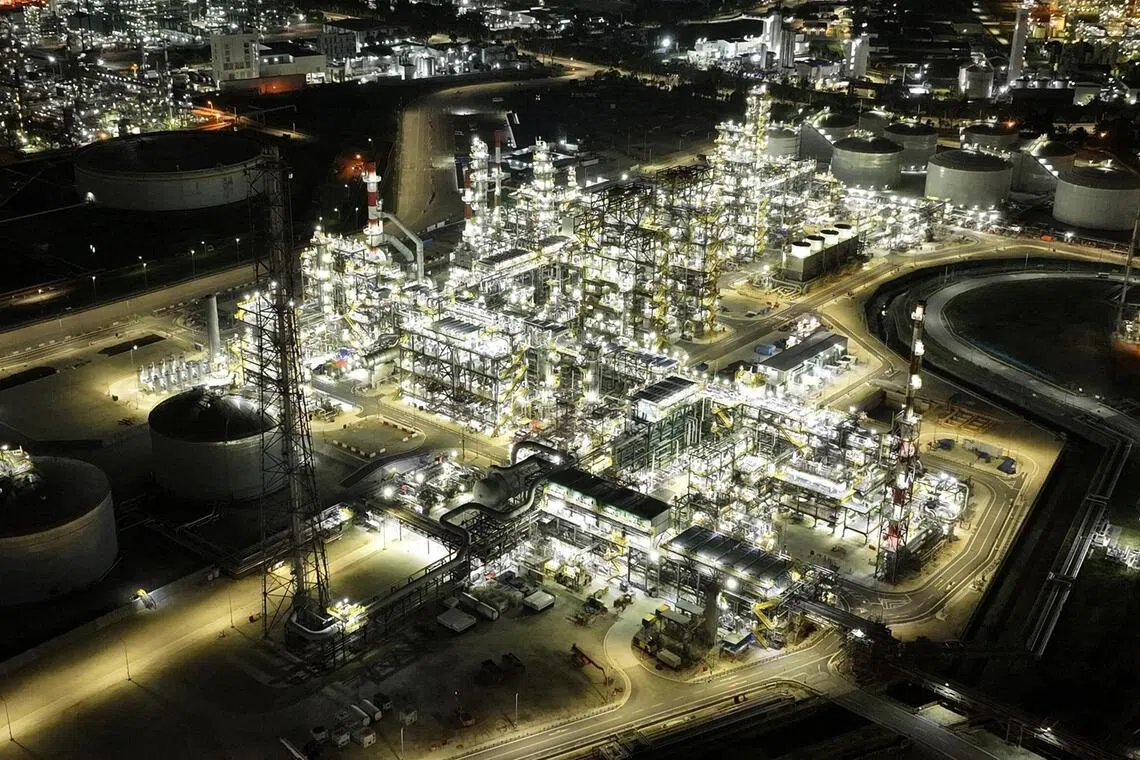Jurong Island oil and gas firms making green shift as sector decarbonises
Sign up now: Get ST's newsletters delivered to your inbox

Decarbonisation is a key part of Singapore’s growth strategy for the energy and chemicals sector.
PHOTO: EXXONMOBIL
Follow topic:
- Advario invests in sustainable aviation fuel storage and blending, alongside low-carbon ammonia infrastructure, aiming to support Singapore's cleaner energy goals.
- Jurong Island targets include boosting sustainable goods production and energy efficiency as part of Singapore’s plan to transform into a sustainable hub.
- Singapore's green transition faces hurdles, requiring reskilling, transparency, and overcoming technical challenges like carbon capture viability, as noted by Ms Kemp.
AI generated
SINGAPORE – On Jurong Island, gas and chemicals storage provider Advario Asia-Pacific has been expanding beyond its fossil fuel focus towards greener pastures, by investing in infrastructure to store cleaner fuels.
The company has set aside tank space equivalent to 34 Olympic-size swimming pools to store and blend sustainable aviation fuel – a less pollutive alternative to jet fuel.
The Dutch company is one of several companies in the emissions-intensive energy and chemicals hub of Jurong Island that are starting to make the green shift.
Around a third of Singapore’s greenhouse gas emissions come from the refining and petrochemicals sector, with over 100 companies on Jurong Island.
Despite the geopolitical headwinds confronting climate action in some countries, recent developments have also pointed to the inevitable transformation of this pollutive sector, which companies like Advario are taking notice of.
“Globally, tightening climate regulations and rising demand for sustainable products are accelerating decarbonisation,” said Singapore’s industrial developer, JTC Corporation (JTC), and the Economic Development Board (EDB) in response to queries from The Straits Times.
For example, Singapore’s carbon tax levied on large emitters
The European Union is also implementing a regulation that makes companies importing certain emissions-intensive goods into Europe pay for the carbon emissions created from producing these products.
Several multinational companies with a Singapore presence have started to feel the implications of these trends.
In 2024, oil giant Shell sold its energy and chemicals park on Pulau Bukom and Jurong Island, as part of measures to boost its overall profitability and lower its carbon footprint worldwide.
As crude prices tumbled in 2025, some global oil companies including Chevron, BP and ExxonMobil have announced thousands of job cuts. On Oct 1, ExxonMobil announced that it plans to reduce 10 per cent to 15 per cent of its workforce in Singapore by the end of 2027.
The energy and chemicals sector is a global industry, and Singapore is an open economy with leading positions in refining, trading and chemical production, said EDB’s vice-president of chemicals and materials, Ms Kelly Lai.
“Due to the global petrochemical downcycle, companies are reviewing their footprints globally, and we are not sheltered from these global developments,” she said.
“With any mature industry, we would expect to see some churn, and naturally then reinvestment and rejuvenation.”
As the energy and chemicals sector transforms, it will need to reimagine its business models, innovate processes, and adopt low-carbon technologies, JTC and EDB added.
Decarbonisation is a key part of Singapore’s growth strategy for the energy and chemicals sector – it enables companies to stay competitive and capture new markets, said EDB and JTC.
Companies on the island are combining immediate measures, such as improving the energy efficiency of industrial processes and deploying solar panels, with those that will take a longer time to scale and commercialise.
Advario is attempting to do this by diversifying its business model beyond fossil fuels to include low-carbon options, such as sustainable aviation fuel.
Its director of business development, Mr Kevin Jen, said: “With increasing societal awareness and stakeholder pressure, demand for traditional hydrocarbons is expected to decline gradually, driven in part by the wider adoption of electric vehicles, as well as transitional fuels in both the maritime and aviation sectors.”
Fossil fuels include naturally occurring compounds of hydrocarbons. While greener fuels are not yet commercially mature, the Dutch company, being family-owned, is able to take a longer-term perspective – one that balances sustainability with commercial discipline, Mr Jen added.
Power generation companies Keppel, PacificLight Power and YTL PowerSeraya are also studying ways of capturing planet-warming carbon dioxide (CO2) from power plants, to identify the specific infrastructure needed to make carbon capture and storage a reality in Singapore.
EDB’s Ms Lai also pointed out that, despite the recent cutbacks, Shell and ExxonMobil still continue to maintain a significant presence in Singapore.
Singapore is home to ExxonMobil’s largest manufacturing site and the company has just started up new production facilities, she said.
Shell and ExxonMobil have since 2024 also been leading a consortium to study the feasibility of capturing CO2 in Singapore for storage in other countries. The aim is to develop a carbon capture project that can permanently store 2.5 million tonnes of CO2 a year by 2030.
“By scaling innovative low-carbon solutions in Singapore, companies can meet sustainability standards, tap regional demand and export new technologies globally,” said JTC and EDB.
On a broader level, Singapore had seen the writing on the wall for the oil and gas sector, and began to move on this front a few years ago.
In 2021, it launched a plan to transform Jurong Island into a sustainable energy and chemicals hub, with 2030 targets to raise the production of sustainable goods, ensure that local refineries and crackers are highly energy efficient, and realise carbon capture.
The authorities will be providing updates on this, including additional announcements, at the upcoming Singapore International Energy Week on Oct 27.
Ms Nikki Kemp, director of the Singapore Green Finance Centre at the Singapore Management University, noted that while the Republic may not suffer widespread job losses due to changes in the sector, it faces a “skills transition challenge”.
Those affected will need reskilling for alternative occupations, leading to additional transition costs, she said.
For example, job functions in electricity transmission and distribution, low-carbon alternatives, solar energy and smart grids are expected to experience significant growth, added Ms Kemp.
She cited a 2024 study which found that, globally, the petrochemical sector’s demand growth is set to weaken over the next 10 years. Roles focused on oil and gas refining and traditional petrochemical production are likely to be restructured and reduced.
“New job opportunities may not emerge in the same location or timeframe as those that have been lost. Therefore, effective employment planning is crucial as part of the transition,” she added.
The 2022 Energy Sector Manpower Survey by the Energy Market Authority showed that Singapore’s clean energy workforce is projected to increase by 80 per cent by 2032, reaching around 2,700 workers. The power sector is also expected to expand by 800 workers during the same period.
Ms Kemp observed that Jurong Island’s transformation is under way with significant technical and governance hurdles.
She noted that carbon capture is a highly technical solution that is currently being tested, but not on a big enough scale. The commercial viability of hydrogen as a clean fuel remains questionable, she added.
She said: “A credible energy transition in Singapore includes a commitment to decarbonise Jurong Island industries, ensuring decarbonisation is permanent, rather than moving operations elsewhere.”
This requires transparency in having a company’s green achievements verified, having public dashboards to track how firms are progressing with their climate goals, and company disclosure about their investment in clean technology, she added.


